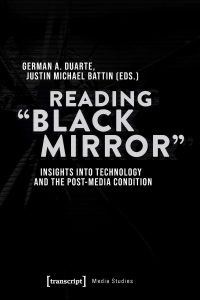In Reading ‘Black Mirror’: Insights into Technology and the Post-Media Condition, German A. Duarte and Justin Michael Battin offer a new collection of essays that provides different frameworks for understanding, contextualising and appraising the influential science fiction TV anthology series, Black Mirror. While finding that the volume does not always fully cohere and often requires prior familiarity with twentieth-century French and German philosophy, there are a number of essays that are worth ample attention, writes Beba Cibralic.
Reading ‘Black Mirror’: Insights into Technology and the Post-Media Condition. German A. Duarte and Justin Michael Battin (eds). transcript Verlag. 2021.
 Find this book (affiliate link):
Find this book (affiliate link): ![]()
It has been a decade since the science fiction TV anthology series Black Mirror first aired. Given the show’s cultural significance, philosophical depth and provocative subject matter, the new volume Reading ‘Black Mirror’ is a welcome contribution. Edited by German A. Duarte and Justin Michael Battin, this collection of scholarly essays provides different frameworks for understanding, contextualising and appraising the series.
Reading ‘Black Mirror’ contains sixteen essays and an Introduction, most of which are written by media studies scholars. While the essays themselves range in style and structure, they are generally unified in their thematic focus: the authors are in conversation with one another about Black Mirror’s treatment of social control, the socio-economic impacts of technology and the personal costs of technologically driven social change. In the background are broader questions about modernity, scientific progress and what the authors refer to, in somewhat disparate ways, as the ‘post-media condition’. Such an ambitious collection, while flawed, is important in helping develop a still-nascent subfield at the intersection of media studies, philosophy of technology and critical theory.
A few essays in the collection were excellent. The first is ‘Mind Games: Playtest as an Allegory for Liquid Modernity’ by Joseph Macey and Brian McCauley, in which the authors examine one Black Mirror episode, ‘Playtest’, with an eye to what the episode reveals about life, love and play in liquid modernity. The essay begins by giving the reader an overview of the episode and then provides some conceptual tools for assessing it (namely, the concepts of ‘liquid modernity’, ‘ludification’ and ‘gamification’). With the reader well-prepared, the authors then offer a sharp, sophisticated and lucid critique of the episode. One of the novel observations the authors make concerns the idea of the ‘gamer girl’:
The very presence of the gamer girl highlights the lack of visibility of females in the prevailing culture of gaming, despite the number of females playing contemporary games, for she reveals the clearly-defined expectations of what a ‘real gamer’ should be, and those who do not accord to this idealised construction are dismissed, relegated to the margins. At the same time, the gamer girl affirms the masculinity and heterosexuality of the gamer, replicating and reaffirming the socio-cultural norms of wider society… (76)
This quotation stands out not only because it helpfully frames the role of the gamer girl in the ‘Playtest’ episode and in the cultural imagination, but also because it is one of the only parts of the volume that deals (however indirectly) with the status of women in Black Mirror. Elsewhere in the volume, in a chapter discussing the episode ‘Nosedive’, the authors make the observation that: ‘In the “Nosedive” society, people displaying emotions linked to frustration, failure, or misfortune are rated so low that they end up being confined to a type of prison, one which punishes for having a bad social rating and in which a woman and a black man are represented’ (173). Unfortunately, no further elaboration or analysis is provided; the relevance of gender and race are striking in the ‘Nosedive’ episode, yet they are treated as an afterthought in the chapter.

Image Credit: Photo by Samuel Scalzo on Unsplash
The second standout essay is ‘Making a Killing: Science Fiction Through the Lens of Nordic Noir in Crocodile and Hated in the Nation’ by Dan Ward. The essay explores how and why Black Mirror uses ‘Nordic Noir’ conventions and, like the ‘Mind Games’ chapter, does so in a manner that is clear and concise. The author gives us details of the plot, an overview of relevant theories and multiple intertextual references; however, nothing superfluous or indulgent makes it to the page.
The most striking aspect of ‘Making a Killing’ is its originality. At times, the volume itself felt repetitive because of its focus on a small handful of Black Mirror episodes: namely, ‘Fifteen Million Merits’, ‘Playtest’, ‘Nosedive’, ‘Hated in the Nation’ and ‘San Junipero’. This meant that, quite often, authors were repeating plots or making points that were similar to ones already made. ‘Making a Killing’, however, was refreshing and novel, to say nothing about how thoughtful and well-argued it was. Speaking more generally, this particular essay is not only an example of excellent scholarship, but a useful pedagogical tool. The clarity of writing and the way in which the author introduces the episode make it a great resource for educators teaching Black Mirror to undergraduates and graduates. Other promising essays in the collection include ‘Technicity and the Utopian Limits of the Body’ by Anna Caterina Dalmasso, ‘Mediated Subjectivities in Postemotional Society’ by Hatice Övgü Tüzün and ‘Exhausting Choices: Bandersnatch and the Future of Our Entertainment Platforms’ by Robbie Fordyce and Thomas H. Apperley.
While there is variation with respect to the topic, scope and philosophical commitment of each essay, many of the collection’s authors draw on contributions from the philosophers Martin Heidegger, Gilles Deleuze, Jacques Derrida and Michel Foucault to ground their analysis of Black Mirror. Readers who are unfamiliar with the aforementioned theorists will find it difficult to understand at least half of the chapters. Many readers will also struggle to make sense of the various references and what they have to do with one another. Consider the following example: ‘…Shelley’s novel leaves the episteme of fragmentation and serialization, which finds its roots in the Phoenician Alphabet and whose maximal expression in Taylor’s application of scientific management, Vickers machine gun, and even Lumière’s Cinématographe…’ (38). To be sure, the example does make more sense in the context of the paragraph; however, even the reader who has access to that additional context must still labour over each word a few times to understand the meaning of the sentence. The sentence above does not represent the writing style of each essay in the volume, but it’s not an anomaly. While the volume itself is easier to understand than any work by Heidegger I’ve encountered, the collection would have benefited from more accessible language, clearer exposition and some definitions of key terms and concepts.
Both Black Mirror and Reading ‘Black Mirror’ bring together standalone works (episodes and essays, respectively) that explore the myriad ways technology can pervert our societies. Unlike the TV series, the volume does not hold together as a cohesive work of excellence. While there are some essays in the collection that are worth ample attention, unfortunately the quality of the work in the volume varies widely. Loyal Black Mirror fans who also have an in-depth understanding of twentieth-century French and German philosophy will likely enjoy the volume despite its flaws; the rest of us will need to look elsewhere.
Note: This review gives the views of the author, and not the position of the LSE Review of Books blog, or of the London School of Economics. The LSE RB blog may receive a small commission if you choose to make a purchase through the above Amazon affiliate link. This is entirely independent of the coverage of the book on LSE Review of Books.







